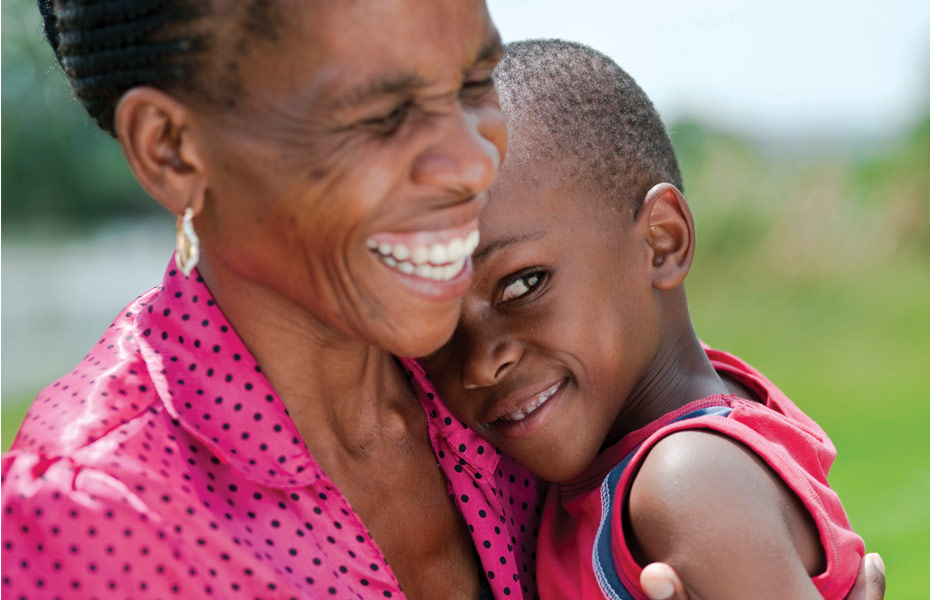
ACCESS TO MEDICINES HIV medications help Thabo feel strong so he can enjoy time with his mother in South Africa. Johnson & Johnson expanded its Global Access Program in 2011 to make its HIV portfolio available to more people like him, who otherwise might not get the medicines they need.
Addressing the Burden of HIV
In March 2011, several non-exclusive licenses were granted to generic manufacturers in South Africa and India to manufacture, market and distribute rilpivirine, an investigational anti-HIV medication subsequently granted approval by the U.S. Food and Drug Administration (FDA) and the European Medicines Agency.
“Johnson & Johnson has expanded the scope of its Global Access Program and licensed generic partners to speed access to rilpivirine, an important new medicine to treat HIV,” says Alan Staple, Manager of Strategic Relationships, the Clinton Health Access Initiative.
Licensing agreements help provide access to rilpivirine in 112 low-resource countries, including Vietnam and Thailand, covering more than 80 percent of people living with HIV worldwide.
Agreements now exist with five generic manufacturers to ensure widespread access to and supply of rilpivirine, both as a single-agent medicine and as a fixed-dose combination with multiple medicines in one tablet that will simplify HIV therapy. Four of these agree-ments were signed prior to receiving regulatory approvals for rilpivirine, allowing generic manufacturers to make generic rilpivirine and the combination pill available more quickly. Collaboration with generic companies extends beyond licensing to sharing technical skills and providing help to ensure safety and quality as well.
In May 2011, the FDA granted approval of EDURANT® (rilpivirine) for treatment-naïve adults (those who have never taken HIV therapy). It is the third anti-HIV medication commercialized by Janssen Therapeutics, Division of Janssen Products, LP; together with PREZISTA® (darunavir) and INTELENCE® (etravirine), the company can provide treatment options for patients at all stages of the disease.
Since 2007, licensing agreements have been used with generic manufacturers to make these HIV medicines available at a low special access price to 65 countries that have a high HIV burden, including India and nations in sub-Saharan Africa. More recently the agreements have been modified to provide access to rilpivirine in 112 low-resource countries, including Vietnam and Thailand, covering more than 80 percent of people living with HIV worldwide. ![]()

Expanding Our Immunology Leadership
In 2011, global approvals and an amended distribution agreement with Merck & Co., Inc. helped Janssen Pharmaceuticals, Inc. expand its leadership and geographic presence in immunology, serving more patients.
STELARA® (ustekinumab), a treatment for moderate to severe plaque psoriasis now approved in 61 countries, was recognized with the prestigious Prix Galien USA Award as the Best Biotechnology Product. STELARA® is in Phase III studies for the treatment of psoriatic arthritis and Crohn's disease, and Phase II studies for the treatment of sarcoidosis and primary biliary cirrhosis.
SIMPONI® (golimumab), a once-monthly subcutaneously administered anti-TNF-alpha therapy, has now achieved approvals in 45 countries. SIMPONI® is in Phase III studies for treatment of ulcerative colitis and juvenile idiopathic arthritis, and as an intravenous formulation for rheumatoid arthritis. It is also in a Phase II study for sarcoidosis.
In September, REMICADE® (infliximab) received U.S. Food and Drug Administration approval as the first biologic treatment for pediatric ulcerative colitis, marking the 16th approval in the U.S. REMICADE® is now available in 106 countries.
In July, marketing rights for REMICADE® and SIMPONI® were transferred from Merck to the Janssen Pharmaceutical Companies in approximately 150 territories. ![]()